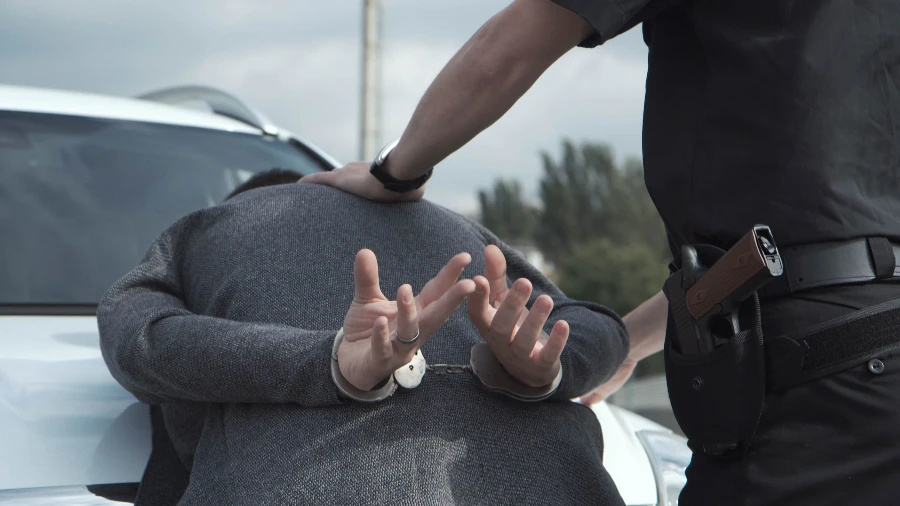
Have you found yourself in a situation where you were arrested but not convicted?
The burning question in your mind may be: do arrests show up on criminal background checks?
The answer is: Yes, pending charges usually show up on a background check because they are part of the public record. While they do not equal a conviction, they are commonly reported in background checks. The appearance of pending charges can vary depending on the jurisdiction, the type of check, and the seriousness of the offense.
Criminal charges generally appear on your criminal record when you are arrested or, if you are not arrested, and only cited, immediately after an offense is filed in the court with jurisdiction over your case.
If you receive a citation for a fine-only offense, however, it may not appear on your record. A fine-only offense example would be a parking ticket that has no other citations attached to it.
In addition to pending charges and arrests not resulting in conviction, a criminal history report typically includes information such as the offense date and the type of offense committed.
Below, the San Antonio criminal defense lawyers at Austin Hagee Law Firm will explain what will show up on your criminal record after committing a crime or receiving a citation.
If you have questions, please contact us today.
See why we have a perfect 5-star rating on Google from reviews of 175+ of our past clients:
When do Charges or Arrests Show Up on Criminal Background Checks?
The Texas Department of Public Safety (“DPS”) keeps records of all criminal charges filed in the state.
It offers comprehensive criminal history record checks to individuals who submit fingerprints to the agency.
It also provides a criminal history conviction name search, which includes only publicly available information. Submitting fingerprints limits the risk of misidentification, but the online search tool is faster.
Both record check methods provide information about charges at the class B misdemeanor level or above that can result in:
- Arrests—a formal arrest is made and criminal charges filed;
- Prosecutions—a case is not dismissed after arrest and is pursued by a prosecutor;
- Case dispositions—someone pleads guilty, receives a guilty or not guilty verdict, or the case is otherwise resolved after prosecution commenced by dismissal, probation, a deferred (non-conviction) probation, or disposal by agreement; and
- Sentencing—what, if anything, the defendant was sentenced to in the case.
Class C convictions are provided if reported to DPS, but not all counties report that data to DPS. When you request a criminal background check, you can use a private service or go directly through the DPS website.
If you use a private service, under the Fair Credit Reporting Act 15 U.S.C. § 1681c, the private service cannot report arrests that did not result in conviction that occurred seven or more years ago unless the job offers a salary of $75,000 or more.
Being Arrested for a Crime
Do arrests show up on criminal background checks? If you were arrested for a crime, taken into your local sheriff’s office or jail, and you were processed by a magistrate judge and had to post a bond to get out of jail, then the answer is, YES, the arrest will show up on a criminal background check.
However, this is NOT a conviction, and it should not be treated as a conviction by the government or by an employer.
This is just an arrest record. There are a couple of ways that this can be removed from your record later on, but that will take place after you have resolved your case.
A single charge shouldn’t have to define you. Fill out our form below and we’ll be in touch shortly.
Receiving a Citation from Law Enforcement
You may have received a citation from a law enforcement officer for a class C misdemeanor, but were not arrested at the time.
This is possible when you commit certain fine-only offenses. In this situation, if you were not arrested and didn’t post a bond, while the ticket is pending it will likely not show up on your criminal record and will only be in the records of the court where your ticket is located.
If you are never arrested for or convicted of a class C misdemeanor, you will likely be able to avoid having it appear on your criminal record. Ensure you pay your fines and show up at court, as required, because failure to do either can result in a warrant being issued for your arrest.
If you are arrested for or convicted of a class C misdemeanor, whether it will show up on a background check is harder to say.
It depends on whether the county reports the information to DPS. If it does not, it may still appear on a background check if reporting is done by a private service that directly contacts county courts.
The smaller the county, the less likely it is that a private service will have access to this class C arrest.
Charged with a Crime But Not Arrested
You may have been charged with a class B misdemeanor or higher but were not arrested at the time of the charge.
This is a unique situation that happens in instances where somebody receives what’s called a “notice to appear” from a sheriff’s office for certain types of offenses.
This might be a case like possession of marijuana (in small amounts), theft more than $100 but less than $750, or even charges for smuggling of a person.
The reason you may have received a notice to appear, instead of being arrested, is to avoid a bottleneck at the magistrate’s office for a common charge.
Most of the time, these cases will not appear on your criminal record until a formal bond is posted, and the individual is processed by a magistrate judge.
Our client was facing charges of driving while intoxicated, potentially facing jail time, license suspension and hefty fines. Their case was dismissed by Pretrial Writ in January of 2025.
In Texas, it may take more than six months after the citation date or notice to appear is issued to be arrested and have a bond set by a magistrate judge due to the high volume of these types of cases in some counties.
In general, the easiest way to know if something will show up on your criminal record is to think about whether you had a bond set by a magistrate judge and posted a bond.
If you were processed and made bond, you likely have an arrest on your criminal record. If this didn’t happen, you likely do not have anything on your record yet, but it would be best to contact a criminal defense lawyer to help you understand your criminal history.
It’s important to understand some of the different scenarios that can arise after a criminal charge and what might be on your criminal record while your case is still being resolved.
How Far Back Do Criminal Background Checks Go in Texas?
Typically, criminal background checks include every criminal charge, regardless of how long ago it occurred, until the charge is expunged or sealed by a non-disclosure order. However, if you were arrested when you were under 18, as a juvenile, your record may have been automatically sealed. Otherwise, you have to ask to remove the arrest from your record for it not to appear.
How Do You Remove an Arrest from Your Record?
You can typically have your arrest expunged if it never resulted in a conviction, your conviction was overturned, or you were pardoned after conviction.
Depending on the circumstances of the arrest, you may have to wait up to three years before you can have your arrest cleared from your record.
If the charges were dismissed because you participated in certain court programs or because there was no probable cause to arrest you, you might be able to expunge the arrest much sooner.
A criminal defense attorney can help you figure out when and how to request an expunction to prevent your arrest from appearing on a Texas criminal background check.
Get in Contact With a San Antonio Criminal Defense Attorney Today
If you are fighting a criminal charge or wondering if you can get your criminal record expunged, you need an experienced criminal defense attorney.
A lawyer can help you navigate the legal system, and help you find out if your arrests show up on criminal background checks. Contact Austin Hagee Law Firm for a case evaluation and start getting your life back on track today. You can also call us at (210) 598-5277.
Where to find our San Antonio, TX office:
